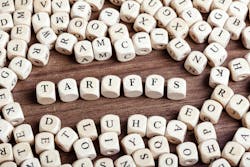US to Raise Tariffs on $18 Billion of China Imports Including Chips
The decision -- which drew a fiery response from Beijing -- comes as President Joe Biden gears up for a rerun of his 2020 contest with Republican rival Donald Trump in November's election, with officials criticizing Trump's record on trade as they made the announcement.
The tariff rate on EVs is set to quadruple to 100% this year while the tariff for semiconductors will surge from 25% to 50% by next year, the White House said.
The action is aimed at encouraging China to "eliminate its unfair trade practices regarding technology transfer, intellectual property and innovation," it added.
This follows a review of tariffs imposed during a trade war between Washington and Beijing, during which then-president Trump introduced levies on some $300 billion in goods from China.
China's commerce ministry warned that the new moves would "severely affect the atmosphere for bilateral cooperation," calling this a politicization of economic issues.
The so-called Section 301 investigation was the primary tool the Trump administration used to justify tariffs, and the U.S. Trade Representative is required to look into the impact of the levies after four years.
Tuesday's actions were also taken under Section 301 of the Trade Act.
Beyond EVs and semiconductors, Washington is roughly tripling tariffs on some steel and aluminum products and on lithium-ion EV batteries and battery parts.
The tariff rate on natural graphite and some other critical minerals will surge from zero to 25%, and that on solar cells doubles to 50%.
But some hikes, such as on non-EV lithium-ion batteries, take effect later to provide a transitional period as the country builds up its domestic battery production, a senior U.S. official said on condition of anonymity.
Beijing's foreign ministry said it "opposes unilateral tariff hikes in violation of WTO rules" when asked about reports of the new measures.
China "will take all necessary measures to safeguard its legitimate rights and interests," spokesperson Wang Wenbin added.
- Excess capacity -
The latest moves impact both products already targeted by the Trump tariffs as well as additional ones.
A USTR spokesperson confirmed there were no tariff reductions.
The levies will ensure that investments in jobs, spurred by Biden's domestic policies, are not undercut by "underpriced exports from China," National Economic Advisor Lael Brainard said.
The Biden administration has pumped massive funding into areas like semiconductor manufacturing and research, alongside efforts to boost green investments.
But Brainard accused Beijing of powering its growth "at the expense of others."
"As a result of unfair practices, China's anticipated manufacturing capacity in solar is more than double the forecasts of near term global demand," she said.
Brainard also took aim at the Trump administration, saying it "failed to follow through" with investments and to ensure China complied with a deal marking a truce in the trade war.
Trump hit back Tuesday, saying Biden should have gone further and acted years ago.
"China is eating our lunch right now," he told reporters.
- 'Pre-emptive strike'-
Hiking tariffs on Chinese EVs would be "a pre-emptive strike" given that few such cars are imported, said Paul Triolo, partner for China at Albright Stonebridge Group.
"It is really a signal to U.S. automakers that the Biden administration is protecting the industry from Chinese EVs," he told AFP.
But tariffs covering EV batteries and supply chains would be "a much bigger issue because of the dominance of Chinese companies in the finished battery space and for critical minerals across the battery supply space," he said.
China is likely to retaliate with tariff increases of its own, Triolo said.
But Beijing is likelier to retaliate strongly if Washington takes measures seen as suppressing Chinese companies, like imposing more trade restrictions on semiconductor firms.
Treasury Secretary Janet Yellen told reporters Monday, when asked about possible tariffs: "I'm hopeful that they will see that the actions that we're taking are targeted."
She added in a statement that issues like overcapacity "will not be solved in a day" and that she would continue to directly address concerns with Chinese counterparts.
All rights reserved ©2024 Agence France-Presse.
About the Author
Agence France-Presse
Copyright Agence France-Presse, 2002-2025. AFP text, photos, graphics and logos shall not be reproduced, published, broadcast, rewritten for broadcast or publication or redistributed directly or indirectly in any medium. AFP shall not be held liable for any delays, inaccuracies, errors or omissions in any AFP content, or for any actions taken in consequence.
